By Dave Michaels and Alexander Osipovich
WASHINGTON -- The electronic-trading firms Citadel Securities
and Virtu Financial Inc. have become pillars of the stock market in
recent years, rivaling the role played by stock exchanges.
Wall Street's new top regulator is putting pressure on them by
questioning a key service they provide: executing the orders of
millions of ordinary investors whose trades go to their black
boxes, instead of being routed to public exchanges.
Testifying before Congress last week, Securities and Exchange
Commission Chairman Gary Gensler criticized the system that funnels
orders to Citadel Securities and Virtu, which pay for the
opportunity to trade with retail stock and options orders. Mr.
Gensler said such incentives -- called payment for order flow --
represent a conflict of interest for online brokerages, which
collectively make billions of dollars a year from the practice. He
voiced concern that the trading firms handling most individual
investors' orders control too much of the business.
In an interview with CNBC on Friday, Mr. Gensler went further,
comparing the retail wholesalers unfavorably with public exchanges
whose prices are considered "lit" because they appear publicly for
all traders to see.
"A lot of these are really just going to the wholesalers, they
are not as lit, they're not as competitive," he said. "So it's not
as clear we are actually getting best execution in an unlit,
internalized wholesaler as contrasted to the lit markets."
It is unclear whether the SEC would go as far as banning payment
for order flow. Doing so would make it harder for brokerages to
offer zero-commission trading, and the agency has reviewed the
practice several times in the past without prohibiting it. Brokers
and traders say routing orders to wholesalers benefits
investors.
People close to Mr. Gensler said his regulatory instincts come
from his long experience in markets, including years at Goldman
Sachs Group Inc. Mr. Gensler puts more trust in regulated trading
venues that post prices publicly and is generally skeptical of
less-transparent systems that give intermediaries more power to set
prices.
"He is certainly looking at it more critically than the SEC has
in recent years," said Larry Harris, a University of Southern
California professor and former SEC chief economist. "Gary has
correctly identified a serious conflict of interest between the
interests of the broker and of its clients."
In the first three months of 2021, Citadel Securities paid more
than $475 million to brokers for handling their customers' stock
and option orders, making it the biggest source of payment for
order flow, according to Bloomberg Intelligence. Among the largest
recipients of such payments were TD Ameritrade, owned by Charles
Schwab Corp., and Robinhood Markets Inc.
Payment for order flow has surged as day trading has grown more
popular during the Covid-19 pandemic and as U.S. brokerages have
dropped upfront commissions, making them lean more on selling order
flow to generate revenue. The practice has also drawn fresh
scrutiny after social-media-fueled trading frenzies in stocks such
as GameStop Corp. earlier this year.
Wholesalers pay brokers for the orders, but also offer slightly
better trading prices than the brokers would get on exchanges,
benefiting investors. Citadel Securities, the largest wholesaler,
said it provided individual investors with nearly $1.1 billion in
such "price improvement" on equities and options trades in the
first quarter. The firm recently floated proposals that could help
exchanges win back a greater share of volume that is currently
executed on less-transparent venues.
The SEC has long allowed payment for order flow, considering it
beneficial for investors, and its use coincides with a drop in
retail trading costs.
Payment for order flow can offer less transparency than exchange
trading, and its importance becomes even more apparent during bouts
of extreme volatility. During one day at the peak of the GameStop
frenzy in January, Citadel Securities executed 7.4 billion shares
on behalf of individual investors -- more than the average daily
volume of the entire U.S. stock market in 2019. On some recent
days, more than 50% of equities trading volume has taken place
outside of public stock exchanges. That threshold was crossed for
the first time in December, largely because of the growing role of
retail wholesalers.
Some have said payment for order flow poses conflicts of
interest for brokerages such as Robinhood, whose revenue from
selling orders is partially offset by how much price improvement
goes to their customers. That means they can either choose more
revenue for themselves or better prices for their customers' stock
trades.
The SEC typically addresses conflicts of interest by requiring
clear disclosure about potential problems. Retail brokerages
already report how much money they earn from payment for order
flow. Robinhood reported $331 million in revenue from the practice
in the first quarter of 2021, more than triple the level from a
year earlier.
Mr. Gensler said Friday on CNBC that "disclosure alone may not
do it." Some countries, such as Canada and the United Kingdom, ban
payment for order flow, he added.
To address the conflict of interest, the regulator could require
brokerages to pass the payments they receive from wholesalers to
their customers, said Mr. Harris, who is on the board of
Interactive Brokers Group Inc. Alternatively, banning the payments
would force wholesalers to compete for orders through offering more
price improvement, he added.
Mr. Gensler has suggested that lack of competition might hamper
how payment for order flow works. Citadel Securities executes 47%
of all retail trades in listed securities, while Virtu has about
25% to 30% of that market share.
"We are going to take a close look at how the market structure
can work best, be most efficient and protect investors," Mr.
Gensler said on CNBC on Friday.
Citadel Securities was a beneficiary of Mr. Gensler's regulatory
moves when he served as chairman of the Commodity Futures Trading
Commission from 2009 to 2014. At the CFTC, Mr. Gensler pushed most
trading of swaps -- derivatives that emulate exposure to assets
such as bonds and currencies -- onto electronic trading platforms
where multiple parties can compete to offer lower prices, instead
of having the contracts arranged privately by big banks.
"Competition and transparency is contrasted to darkness and
concentration," Mr. Gensler said Friday. "That is the balancing.
Bring transparency and competition into markets -- that is good for
investors, that is good for issuers."
Write to Dave Michaels at dave.michaels@wsj.com and Alexander
Osipovich at alexander.osipovich@dowjones.com
(END) Dow Jones Newswires
May 09, 2021 12:14 ET (16:14 GMT)
Copyright (c) 2021 Dow Jones & Company, Inc.
Charles Schwab (NYSE:SCHW)
Historical Stock Chart
From Mar 2024 to Apr 2024

Charles Schwab (NYSE:SCHW)
Historical Stock Chart
From Apr 2023 to Apr 2024
